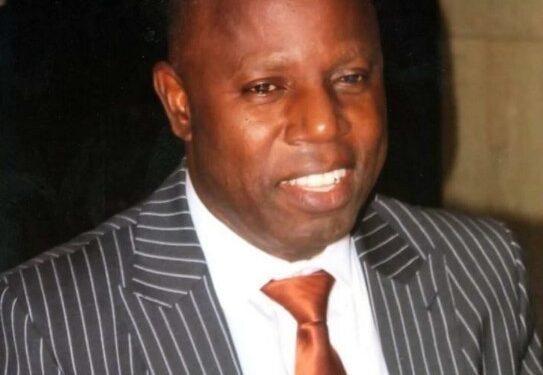“The media and the government have critical roles to play in reducing substance abuse among the youth. The media needs to take its social responsibilities seriously and ensures that it projects values that would make the society better and stronger.”
In September 2023, a 24-year old lady had a birthday party in a South-West state where one of the guests offered to sell sachets of ‘Milo’ for N1,500 each. The guest, a young lady, had mixed marijuana with Milo and put same in Milo sachets, which had been so expertly sealed that no one would have suspected what the content of the sachets was.
The guests at the party rushed the ‘Milo sachet’ and went on a binge, drinking and smoking themselves to get ‘high’. After getting high, fight eventually broke out among them and security operatives had to be brought in to maintain the peace. It was at that point that unsuspecting members of the public got to know that the party guests had gone on a marijuana trip.
According to the World Health Organisation (WHO), substance abuse, or misuse, is the harmful use of psychoactive substances, including alcohol and illicit drugs. A psychoactive substance is a drug that affects how the brain works and causes changes in mood, awareness, thoughts, feelings, or behaviour.
Examples of psychoactive substances include alcohol, caffeine, nicotine, marijuana and some pain relievers. Other substances abused by Nigerian youths include, ice, molly, cannabis, tobacco, cigarettes, cocaine, sedatives, kolanuts, analgesics, glue, heroine, energy drinks, miraa, tramadol, tranquillizers, cough drops, antimalarial and antibiotics.
Substance abuse is detrimental to health and wellbeing of those involved in it. A Nigerian singer, Joshua Iniyezo aka Solidstar, recently disclosed how substance abused nearly ruined him. According to him, he was introduced to a banned substance called Ice in 2021. He said the substance made him see himself as ‘’a king” who didn’t have to pay for any item. One day he walked from Awoyaya in Lagos Mainland to the Oriental Hotel, a distance of about 32 kilometres.
Another singer, Inetimi Alfred, popularly known as Timaya, said he was introduced to Molly, a synthetic drug with psychedelic effects. The drug initially brought him happiness but eventually led to detrimental effects on his health, including weight loss and financial struggles.
Timaya said: “When I took it, I did not understand myself. I was so happy that I dashed all the money in my pocket. So I wanted to just keep feeling like that. That was how I lost a lot of weight. I was not eating, I was just happy.
“When I said I was taking Molly, I was taking like three pills every day and it felt like medication. I got kicked out of jobs and contracts… people I was doing business with did not want to work with me again.”
So, substance abuse makes the youth to get ‘high’ but it does more than that. It can make them paranoid, it can precipitate heart attack or failure, stroke, seizures, sleep disorders, drowsiness, nausea, respiratory depression, fatigue, disorientation, impairment in memory, learning, concentration, and problem-solving, hallucinations, decline in academic performance, etc.
As seen in the case of Timaya, it can result in job loss and can pose a threat to relationships. There is also the tendency to engage in criminal activities when ‘high’.
Substance abuse among Nigerian youth is nearing the status of a pandemic. According to the National Drug Law Enforcement Agency (NDLEA’s) statistics, about 40 per cent of Nigerian youths between 18 and 35 years are deeply involved in the abuse of drugs. What does the future hold for the country if 4 out of every 10 young people are engaged in substance abuse?
Media and Substance Abuse
The media is central to our lives. The media shapes our perception of the world. The media is actually the gateway to the mind. The media accesses the mind through the eyes and the ears. So, media contents are food for the mind. The mind is where decisions are made and where opinions are formed. Since the media has access to the mind, the media subtly controls the mind and plays a major role in the decision-making process. So, when the media projects something as good, many people in the society take a cue from the media and believe that it is good. In the same vein, when the media projects an act as evil, the society largely avoids it.
The media never leaves anything it comes in contact with the same way; it always affects them one way or the other. The media affects individuals in six various ways:
The media can affect cognition, which is the mental process. By affecting an individual’s cognition, the media affects his perception to the extent that he begins to see a particular phenomenon in a new light;
The media also affects beliefs. The Western media has consistently showcased the Western culture as being superior to the African culture and this, to a degree, has been absorbed by some Africans who try all they can to travel abroad for ‘greener pastures’ only to get there and find out that the grass is always greener on the other side;
The media also affects attitude. If a child is exposed to violence, he begins to see violence as an option and will be tempted to try same every now and then;
Another media effect is affect. This has to do with feelings, emotions and moods. Seeing a scene on television or reading about an event can affect the mood of an individual throughout the day;
Media also has psychological effect on its audience. This means the media can affect the orientation of people;
The media also affects the behaviour of its users. Behaviour is the culmination of all the effects of media exposure that have been listed. By the time cognition, belief and attitude are affected, behaviour will change.
Ladies and gentlemen, in light of the above, I will like to submit that advertently or not, the media has been encouraging substance abuse. This is a global phenomenon and not a Nigerian thing.
When a television ad presents a successful musician with a bottle of an alcoholic drink at the background, though the focus of the advertiser, from all intents and purposes, will be to draw the attention of the society to its alcoholic drink, but the loud message is that “To be as successful as the musician in the ad, take alcohol”. Or, “Successful people take this alcohol; don’t you want to be like them?”
When a musical video glamourises boozing and smoking, what is the message to the society? A song like ‘Foti Foyin’, brush your teeth with alcohol, encourages the youth to consume alcohol, while a musical video like ‘Asake Loaded’ celebrates smoking. The producers of these musical contents are role models in the society. Some of them are even brand ambassadors. If, as we said, the media is the gateway to the mind, what is the message of these media contents to the society?
The media has to be alive to its social responsibility, if Nigeria will win the war against substance abuse by the youth.
The social responsibility theory of the media mandates the media to put the societal wellbeing at the centre of its activities. This theory says that the media has a responsibility to the society and should always work in the interest of the society. While a media outfit may be a business organisation that must make returns to its shareholders, the operators of the business must realise that they will only continue in business if the society survives. If the society is destroyed, the business outfits operating in it will also go down. The easiest way to destroy a society is to destroy its youths.
If the media understands this responsibility and upholds it, it will be clear that the future of the youth who are being exposed to substance abuse is of more importance than the immediate pecuniary gain they will make by pushing out deleterious contents that will push the youth into seeking substances that would make them high.
The media is a major factor in the wellbeing of the society because it plays a major role in what is permissible or prohibited. This is done through what it promotes or refrains from promoting.
As part of its social responsibility, the media should embark on sensitisation of the public on the dangers inherent in substance abuse. This should be continuous and sustained as the media’s contribution to the wellbeing of the society.
Government and Substance Abuse
The government is the most important factor in curbing substance abuse because government is a change agent. Whatever the government permits gains prominence and whatever it prohibits is frowned at.
The government fights substance abuse through four major means:
A. Government attempts to curb substance abuse through orientation and reorientation. By deploying its massive resources, the government can get across to all strata of the society on the ills of substance abuse and why it is pertinent for it to be spurned by the youth. By making use of all channels of communication and all media outlets, the government can drive home the point on why substance abuse should not be embraced by the youth.
B. Another means the government deploys to curb the spread of substance abuse is regulation. The Federal Government has, over the years, come up with various regulations to reduce substance abuse in the country. These include:
The Indian Hemp Decree No. 19 of 1966; The Indian Hemp (Amendment) Decree No. 34 of 1979; The Indian Hemp (Amendment) Decree, and the Special Tribunal (Miscellaneous Offences) Decree No. 20 of 1984; The Special Tribunal (Miscellaneous Offences) (Amendment) Decree of 1986 and the National Drug Law Enforcement Agency Decree No. 48 of 1989 (as amended by Decree No.33 of 1990, Decree No 15 of 1992 and Decree No. 62 of 1999). These laws were harmonized as an Act of the parliament, CAP N30 Laws of the Federation of Nigeria (LFN) 2004. This Act established the NDLEA;
C. The government also fights substance abuse through enforcement. The NDLEA is the agency of government primarily saddled with the enforcement of substance abuse laws. The agency, which is under the Federal Ministry of Justice, is charged with eliminating the growing, processing, manufacturing, selling, exporting, and trafficking of hard drugs. The agency was established by Decree Number 48 of 1989. [1] The NDLEA is present in international airports, seaports, and border crossings. The NDLEA is supported by the Nigeria Police Force in enforcing the laws;
D. The last leg is prosecution. Section 11 (a) of NDLEA Act makes it an offence for a person, who having no lawful authority to do so, to engage in the importation, production, manufacturing, processing, growing and planting of cocaine, heroin, LSD or any other drugs of similar nature. The offence is punishable on conviction with life imprisonment. Section 11(b) and (c) also spell out punishments for those who contravene NDLEA laws. The import is that NDLEA is the primary agency with prosecutorial powers on substance abuse. The Nigeria Police Force can also prosecute.
Of the four legs to combating substance abuse, it is only orientation and reorientation that involve the three tiers of government. The remaining three, regulation, enforcement and prosecution are within the ambits of the Federal Government. How can NDLEA be on top of the situation of those smoking igbo at Igbo Ora or those sniffing Kushy at Kishi?
The point here is that substance abuse among Nigerian youths is on the rise because the strategy is wrong. Every criminality is local. Therefore, criminality is best fought or combated at the local level. Nigeria cannot successfully overcome the challenge of substance abuse among the youth unless the states and local government authorities are fully involved in it.
That brings us again to the issue of the elephant in the room: restructuring. We need to restructure the policing system as well as the substance abuse regulation and enforcement systems to defeat substance abuse among the nation’s youth.
The media and the government have critical roles to play in reducing substance abuse among the youth. The media needs to take its social responsibilities seriously and ensures that it projects values that would make the society better and stronger. The government needs to take its sensitisation and orientation responsibilities very seriously.
Then, the system of government that makes the fight against substance abuse more of a matter of the Federal Government needs to be tinkered with so that all tiers of government can own the battle and deliver our youths from the jaws of substance abuse.
•Being the text of a paper delivered by Sulaimon Olanrewaju, Special Adviser (Media)/Chief Press Secretary to Oyo State Governor, at the first Bayo Faleke Annual Lecture on Radio at Fresh FM, Ibadan, on Friday, March 29, 2024.






























